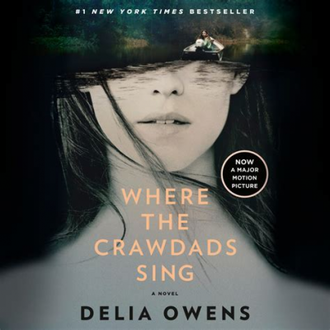Film: Where the Crawdads Sing

There have been huge expectations of this film in the United States where the novel, by Delia Owens, has sold over 12 million copies. Beyond the United States, audiences will not be familiar with crawdads. But, these birds contribute to an arresting title.
Commentators on the film, its style and impact, are sometimes quite contrary. One way of appreciating the filming is to note that the main contributors are all women, the writer of the novel, the writer of the screenplay, the film's director, the producers, and the performance by Daisy Edgar-Jones in the central role of Kya. Their collaboration leads to quite a feminine sensibility. And this communicates to an audience, both women and men. However, it would seem that some reviewers and audiences, with a strong male sensibility have not been particularly moved. And some dismissed the film as emotional, mentioning the popular television Hallmark films, noted for their emotional storytelling.
And, there is a difficulty with the screenplay in terms of where the audience attention and interest is focused.
At the opening, there is a death, a possible murder. The young woman who lives in Marsh (the setting is North Carolina during the 1950s and 1960s), shunned by the townspeople as "The Marsh Girl", is arrested, locked in a cell, interviewed by the retired lawyer from the town, Tom Milton (and veteran David Strathairn is always welcome on screen). But, very quickly, the screenplay goes to flashbacks, to the history of the Marsh Girl. And quite a lot of time is spent on this portrait of her. In fact, this seems to be the main dramatic thrust of the film - more than interesting for those who are wanting to get to know Kya, perhaps somewhat distracting (or more) for those who are expecting a murder mystery, a trial, and the solving of the mystery.
The young child actor, Jojo Regina, is persuasive as the young Kya, experiencing brutality from her soldier father, traumatised by the war, a violent man. He drives away his wife, then the other children, leaving Kya to manage until he too disappears. She lives alone, manages her life, but has a great attraction to the birdlife and insect life of the marshes. (And they are beautifully photographed.)
While the screenplay does return, at times, the comparatively brief sequences in the courtroom, there is much more about Kya's growing up, her encounter with the childhood friend, Tate (John Taylor Smith) with whom she bonds. But, for her, life is disappointing. He disappears. Then a brash young man appears in the town, Chase (Harris Dickenson) - and we are alerted because we know right from the beginning that he is the dead man.
We are certainly on Kya's side, appreciating how she survived as a young girl, finding mussels and exchanging them for goods with a very sympathetic black storeowners. We see her bonding with Tate, sharing the love for nature, dismayed at his departure, wondering about the advances by Chase, a personality we don't like.
It is not necessarily a spoiler to note that the jury's verdict goes in favour of Kya and that there is a brief summary at the end, of Kya and Tate over the years, their life together, their work together - and Tate's discovery, and ours, of what actually happened to Chase all those decades ago.
US, 2022, 125 minutes. Daisy Edgar-Jones, Taylor John Smith, Harris Dickenson, David Strathairn, Michael Hyatt, Sterling Macy Jr, Logan Macrae, Bill Kelly, Garret Dillahunt, Jojo Regina. Directed by Olivia Newman.
Watch the official trailer here: www.youtube.com/watch?v=PY3808Iq0Tg


















